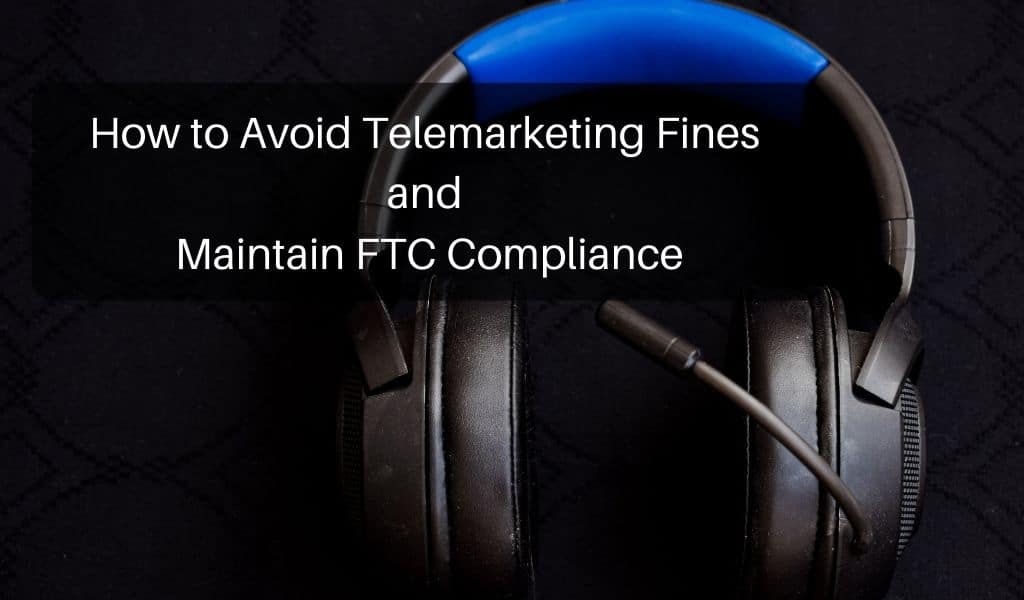Telemarketing fines can be hefty, making FTC compliance and adherence to other laws an important part of conducting your telemarketing business.
If you’re running a telemarketing business, there’s a lot more to think about than just making as many sales calls as you can in a day. One federal law, in particular, requires FTC compliance while another calls for compliance with the FCC to avoid telemarketing fines. These laws aren’t particularly hard to follow, but even the slightest misstep could end up costing your business a lot of money.
FTC compliance primarily points to the Telemarketing Sales Rule, which the commission oversees, but there’s also the Telephone Consumer Protection Act of 1991 (TCPA), which is governed by a sister agency, the FCC. In March of 2021 alone, the FCC delved out telemarketing fines of $225 million to just two companies found to be out of compliance with their robocalling rules. FTC compliance is just as strict, though the penalties may be lower, depending on the nature and scope of the offense. In both cases, you can see how much it can cost a business to be out of FCC and FTC compliance.
Fortunately, telemarketing fines don’t have to be a part of your future. By following a few simple rules, you can avoid telemarketing fines and maintain compliance whether you’re a call center, an individual, or some other sales team. A quick word of caution, though: Like many laws, these are updated regularly, so you should always stay on top of the most current information and court rulings to ensure compliance at all times.
Let Call Logic help you stay in compliance with do not call lists and other regulations. Find out more by scheduling a free demo to see for yourself how we can reshape your business!
What you need to know about telemarketing fines and the Telemarketing Sales Rule
In summary, the Telemarketing Sales Rule requires telemarketers to make specific disclosures of material information, prohibits misrepresentations, sets limits on the times telemarketers may call consumers, prohibits calls to a consumer who has asked not to be called again, and sets payment restrictions for the sale of specific goods and services. The rule was initially written in 1995, but has been updated four times since then, the last time in 2015 to include bits about text messaging and other technological advancements.
There are a few ways to adhere to FTC compliance here and avoid costly telemarketing fines. The first and perhaps easiest to follow is for a telemarketer to identify themselves immediately and who they represent when a call begins. Additionally, any information provided must be “clear and conspicuous” before any financial transactions are made. Failure to adhere to this could result in a fine of $43,792 for each offense. That can add up quickly.
Compliance with the TSR also means only calling consumers between certain daytime hours, transmitting caller identification information so callers can screen numbers, not practicing unauthorized billing, applying all these same rules to upsells for the same consumer, restricting payments for the sale of certain goods, and services, and requiring that specific business records be kept for two years.
The rule was updated to include restricting the use of prerecorded messages while also addressing certain practices by debt relief services and ultimately amended to regulate certain payment options, such as remotely created payment orders and checks, among others.
If this seems like a lot of rules to stick to so you don’t end up with heavy telemarketing fines, don’t worry. If your business is honest and trustworthy, you shouldn’t have too much trouble following most of these rules. In short, be upfront, be truthful, don’t bother people outside of calling hours, and make sure to keep your records for two years to maintain FTC compliance.
What you need to know about staying in compliance with the Telephone Consumer Protection Act
TCPA compliance can be difficult to maintain as it doesn’t relate to as much fraudulent material as the TSR. Instead, the FCC-governed TCPA addresses certain behaviors that can easily come about as accidents. With auto-dialer software like Call Logic, you can get help managing some of these regulations, but at the end of the day, compliance is still on the individual and company.
To stay compliant with the TCPA, follow these guidelines:
- Don’t call anyone before 8 a.m. or after 9 p.m. on weekdays. Weekends should be avoided altogether.
- Maintain a company-specific do-not-call list of consumers who’ve asked not to be called, as well as abide by the National Do Not Call Registry. The company-specific list only needs to be honored for five years, but the national list should be honored as long as a number remains on it.
- Provide identifying information about yourself and your company (similar to the TSR).
- Don’t call residences with an artificial voice or recorded message (some exceptions apply).
- Don’t use automated telephone equipment to contact emergency numbers, hospitals or healthcare facilities, mobile phones, or any service for which the recipient is charged.
- Don’t send unauthorized advertising faxes.
- Don’t make autodialed calls that engage two or more lines of a multi-line business.
These guidelines are reviewed and updated frequently, especially now with the advent of text message advertising and sales, so be sure to stay updated on these regulations to avoid those hefty telemarketing fines. (TCPA non-compliance, by the way, can cost $500 per violation or result in an injunction or both, or if the non-compliance is deemed willful, the fine goes up to $1,500 per offense.)
In short, FTC compliance and FCC compliance both mean acting in a compassionate, respectful manner that establishes trust, which should be a foundation of any sales group in the first place. Treat people the way you’d want to be treated, stick to weekday calls during daylight hours, and where possible, reduce the use of recorded calls unless you’re leaving a voicemail. Following these rules should help you dodge a lot of unwanted telemarketing fines while also giving your business a good reputation amongst consumers, which may be just as important as keeping the money you have invested in your business rather than sending it to the government.
Invest in the only TCPA-compliant auto-dialer with Call Logic. Learn more about this and other great features by scheduling a free demo today!

